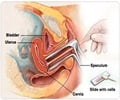Experimental vaccine eliminates human papillomavirus (HPV) infections in one-third of cervical cancer precursors, reveals a new study.

‘A therapeutic vaccine called Tipapkinogen Sovacivec (TS) injects a specific protein that triggers an immune system response to attack high-risk human papillomavirus (HPV) types that cause nearly all cervical cancer precursors known as cervical intraepithelial neoplasia.’





HPV is a common sexually transmitted infection and causes warts in the body. The vaccine eliminated both precancerous skin growth in the cervix, and underlying HPV infection in a third of women enrolled in the clinical trial, according to the report in the journal Gynecologic Oncology.
"There are few products trying to cure women with an HPV infection," said Diane Harper, a professor at the University of Michigan. "It’s exciting. This is the first time we’ve seen something with this success rate, and that is relatively easy to implement," Harper said.
The study enrolled 192 women, diagnosed with precancerous skin growths, randomizing 129 to receive the vaccine and 63, placebo.
Women were given three shots in thighs, one per week. Six months later, the women were treated with standard surgical procedures, and the removed tissue was examined. As many as 15-36 percent of those who were vaccinated saw their more severe precancerous skin growths eliminated, but none in the placebo group.
Advertisement
Harper also noted TS is different from Gardasil9, the vaccine given to prevent HPV infection. While Gardasil9 prevents HPV infection from occurring, TS clears tissue infected with it.
Advertisement
Source-IANS














